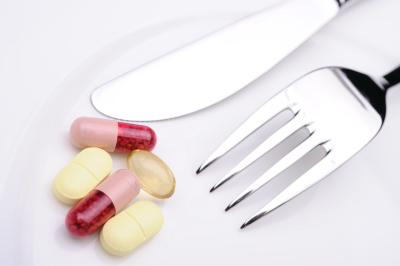Dietary supplements contain one or more dietary ingredient including vitamins; minerals; herbs or other botanicals; amino acids, and other substances. Dietary supplements are the substances meant to improve your diet. They come in various forms such as pills, capsules, powders and liquids.


Who needs dietary supplements?
Dietary supplements may be suitable for you if you:
• Do not eat properly or consume less than 1,600 calories a day.
• Are a vegetarian who eats a limited variety of foods. Strict vegetarians may need vitamin B12 supplementation.
• Are pregnant or breast-feeding.
• Experiences heavy bleeding during your menstrual period. Postmenopausal woman also need supplements.
• Have a medical condition such as chronic diarrhea, food allergies, food intolerance or a disease of the liver, gallbladder, intestines or pancreas. Such conditions affect how your body absorbs, uses or excretes nutrients.
Choosing dietary supplements:
If you decide to take dietary supplement, mull over these tips:

• Check the label: Read the supplements label carefully. By reading product labels you can see what the active ingredient or ingredients are, which nutrients are included and the serving size.
• Avoid supplements that provide mega doses: In general, choose a multivitamin-mineral supplement that provides about 100 percent of the Daily Value (DV) of all the vitamins and minerals. One exception to this point is calcium. Calcium-containing supplements don’t provide 100 percent of the DV. If they did, the tablets would be too large to swallow.
• Look for the testing organisation label: This ensures that the supplement meets the standards for strength, purity, disintegration and dissolution established by the testing organization.
• Check expiration dates: It is a must for every eating item you buy. Dietary supplements can lose effectiveness over time, especially in hot and humid climates. If a supplement doesn’t have an expiration date, don’t buy it.
• Store supplements safely: Put supplements in a locked cabinet or other secure location out of children’s reach. Store dietary supplements in a dry, cool place. Avoid hot, humid storage locations, such as in the bathroom.
• Check alerts and advisories: The Food and Drug Administration keeps a list of dietary supplements that are under regulatory review or that have been reported to cause adverse effects. Keep yourself well informed regarding it.
Using dietary supplements:
• Never go overboard with the doses: Always take a dose that you can tolerate. Taking a higher dose will do you no good; the body normally absorbs tolerable dosages well. Your body can absorb the supplements better and faster if you take small doses every time. The faster you can absorb it, the better it is to correct deficient amounts in your bloodstream.
• Take your dietary supplements with meal: Eating produces large amount of stomach acid because it is the one that will aid in the digestion of food that we eat. This means that when you take in your dietary supplement after eating, your body can metabolize the mineral easily.
Why whole foods are better than supplements?
Whole foods offer three main benefits over dietary supplements:
• They provide greater nutrition: Whole foods contain not just one but a variety of the micronutrients which our body needs. An orange, for example, provides vitamin C plus some beta carotene, calcium and other nutrients. Whereas a Vitamin C supplement lacks these other micronutrients.
• Essential fiber: Whole foods provide dietary fiber to our body. Fiber can help prevent certain diseases, such as type 2 diabetes and heart disease, and it can also help manage constipation.
• Protective substances: Fruits and vegetables, for example, contain naturally occurring food substances called phytochemicals, which may help protect you against cancer, heart disease, diabetes and high blood pressure. They are also good sources of antioxidants.
Also read:
Diet Foods: Five healthiest foods to include in your diet
Diet Salad and Vegetable Soup
10 Essential Diet Foods
Easy Way to Diet
Top 10 Diet Excuses : Eat Right, Lose Weight
9 Common Diet Excuses











great article.
I only took supplements during pregnancy
I am taking vit-b12 supplement, my lips were damn dry i read some-where it is due to vit B deficiency , now the dryness has gone and my lips are very supple……
Nice article! My nutritionist had put me on Multi vitamin , whey protein(since I’m a vegetarian), Omega-3 fatty acid and Calcium for 3 months and my skin, hair and overall health improved a lot! According to her, there should be a gap of 1 month after every 3 months of taking supplement otherwise the body gets accustomed to supplements.
Nice article 🙂 please do a review on food suppliments (revital) as well 🙂
oh lemme tell you now only..revital sucks..my mom tried it!
pls dont waste your money on it…
:waytogo: :waytogo: :waytogo: :waytogo: :waytogo: